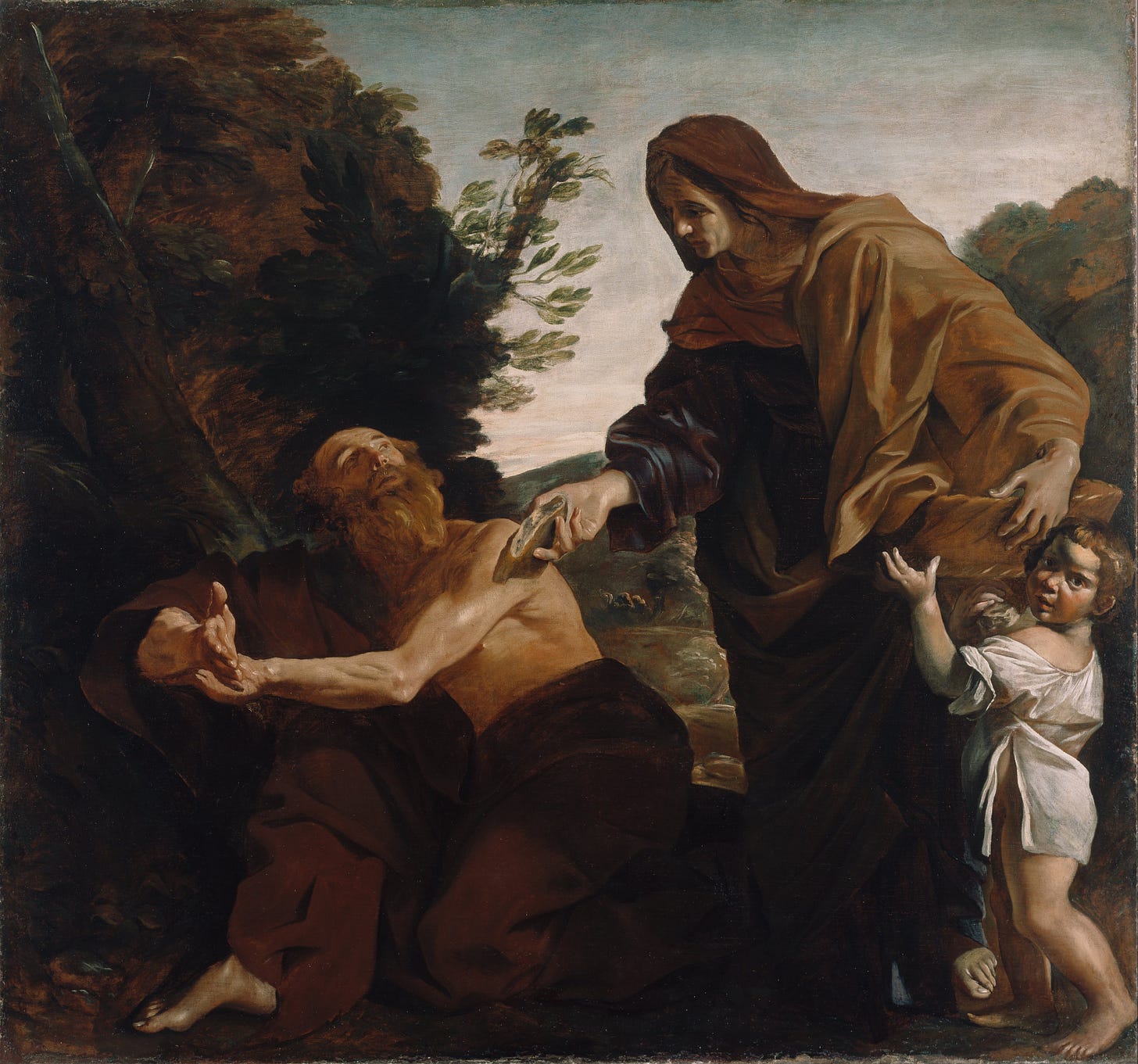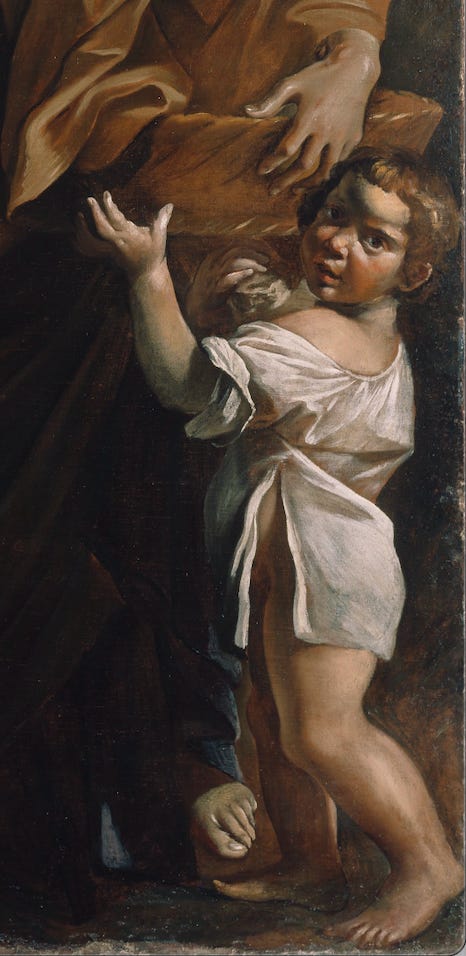Then the word of the Lord came to him, “Arise, go to Zarephath, which belongs to Sidon, and dwell there. Behold, I have commanded a widow there to feed you.” So he arose and went to Zarephath. And when he came to the gate of the city, behold, a widow was there gathering sticks. And he called to her and said, “Bring me a little water in a vessel, that I may drink.” And as she was going to bring it, he called to her and said, “Bring me a morsel of bread in your hand.” And she said, “As the Lord your God lives, I have nothing baked, only a handful of flour in a jar and a little oil in a jug. And now I am gathering a couple of sticks that I may go in and prepare it for myself and my son, that we may eat it and die.” And Elijah said to her, “Do not fear; go and do as you have said. But first make me a little cake of it and bring it to me, and afterward make something for yourself and your son. For thus says the Lord, the God of Israel, ‘The jar of flour shall not be spent, and the jug of oil shall not be empty, until the day that the Lord sends rain upon the earth.’” And she went and did as Elijah said. And she and he and her household ate for many days. The jar of flour was not spent, neither did the jug of oil become empty, according to the word of the Lord that he spoke by Elijah.
~1 Kings 17:8–16
And in his teaching he said, “Beware of the scribes, who like to walk around in long robes and like greetings in the marketplaces and have the best seats in the synagogues and the places of honor at feasts, who devour widows' houses and for a pretense make long prayers. They will receive the greater condemnation.”
And he sat down opposite the treasury and watched the people putting money into the offering box. Many rich people put in large sums. And a poor widow came and put in two small copper coins, which make a penny. And he called his disciples to him and said to them, “Truly, I say to you, this poor widow has put in more than all those who are contributing to the offering box. For they all contributed out of their abundance, but she out of her poverty has put in everything she had, all she had to live on.”
~Mark 12:38–44
A brief interlude in our Matthew series. The lectionary brought us this pair of readings last Sunday; I thought the pairing quite striking.
Jesus teaches us in parables, but the lives of Scripture’s characters are themselves parables: unsolvable little riddles that beg to be solved, but disappear as soon as you’ve claimed to solve them.
Elijah’s life was one parable after another, and it’s remarkable how many of these riddles are precursors to things Jesus taught, did, or lived. Not just the widow’s mite, but then the raising of her son, his confrontations with powerful religious leaders, and how the lives of both never really ended as they were taken up into heaven.
There’s at least one significant difference between the life of Elijah & the life of Jesus, though.
In 1 Kings 19, Elijah, pursued by Jezebel & full of despair, prays, “It is enough; now, O Lord, take away my life, for I am no better than my fathers.”
In the Gospels, Jesus, whose soul is also sorrowful, “even unto death,” prays: “My Father, if it be possible, let this cup pass from me; nevertheless, not as I will, but as you will.”
Elijah is sick of being a parable. A prophet’s role, so often, is to live out the drama that God sees in his people. Elijah would prefer not to.
Jesus is still full of life. He doesn’t get tired of living the parable, teaching the parable, exemplifying the parable—though his greatest embodiment of a paradoxical parable is yet to come: “Greater love has no man than
In the painting by Giovanni Lanfranco, I’m struck by the depiction of the widow’s son. Like every little kid, he’s just trying to be helpful, helping out his mom, helping carry the basket of bread. He doesn’t seem too concerned; doesn’t know the last of their flour went into this bread; doesn’t feel the oncoming symptoms of the sickness unto death that will soon overpower him.
Look at James Tissot’s depiction of the widow’s offering:
You know the widow let her kid put the coin in the box. The kid is thinking “Yeah, I helped Mom. Put the money right in that box. Didn’t even miss. I guess I’m a pretty big kid now.”
While the widow’s thinking, “Where’s supper going to come from?” Or maybe “My soul is very sorrowful, even to death. Take this cup from me.”
The Christian iconographer Jonathan Pageau recently wrote about the wild stories that have sprouted throughout Christian history, wherever the Church goes.
Christianity’s demythologizers tried to make Christianity more appealing to “modern” people. Their work, beginning in the Enlightenment & ironically inspiring fundamentalism along the way, tries to make these Christian stories less strange, more “rational.” But, Pageau writes,
We are now discovering how much of the deep rooting of the things we call “morality” and “ethics” are in fact found in the structures of the very stories we have decided to eliminate.
Rather than transforming these strange stories into something sanity and intelligible, why not transform our own imaginations to make us more capable of grasping their otherworldly strangeness?
“Do not conform to the pattern of this world, but be transformed by the renewing of your mind,” Paul wrote (I’m quote the NIV translation here, which is how I learned it growing up). I was always taught that this meant, basically, being good. Not smoking pot. Not listening to music with swear words. The usual evangelical fundamentals.
But if you study Paul’s own wild life—his pre-conversion persecution of the earliest Christians; his radical conversion; his imprisonments, shipwrecks, & travels throughout the Roman empire—you’ve got to belief that this is a pretty weak interpretation of his words.
Paul was on fire. His life was radically changed. It wasn’t just that he was a good boy now. His imagination had been transformed. His life, like Elijah’s, became a parable: God turned Paul into a living, breathing, parody of everything he had lived & fought for. He became a parable of the power of the sacred to utterly transform your life toward the wild & the good.
What would your imagination be like if it underwent a radical transformation?
What parable would you tell about your life?
What parable would Jesus tell about your life?





